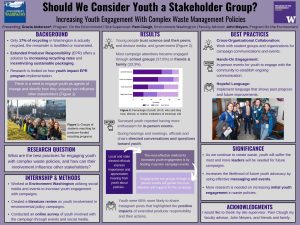Why Should We Consider Them a Stakeholder Group? Increasing Youth Engagement with Complex Waste Management Policies
Our society encourages us to constantly consume and throw away single-use paper and plastic packaging. This waste has a significant impact on the environment and drives climate change. Washington state loses an estimated $104 million a year to recyclables being landfilled or incinerated, as current recycling systems cannot manage the sheer amount of waste produced. Extended producer responsibility (EPR) recycling programs offer a solution to increase recycling rates and incentivize sustainable packaging. My study aimed to analyze grassroots organizations’ unique opportunity to engage youth in complex waste management policies and understand how their engagement can drive stronger waste management programs. During my time working on Environment Washington’s campaign to implement EPR, I evaluated factors that enabled youth to take action. To accomplish this, I attended weekly meetings and events to observe how youth responded to different events and their perceptions of the campaign. I also administered an online assessment to youth involved in the campaign to understand what initially motivated them to get involved. I implemented a social media plan to engage a new demographic and understand what content reached the most viewers. Finally, through meetings and hearings, I observed how other stakeholder groups perceived youth when advocating for EPR. With this information, I determined that hopeful solution-oriented messaging partnered with consistent in-person campaign events is necessary to increase continual engagement in youth. By increasing engagement, grassroots organizations can benefit from the unique communication tactics developed by youth and likely increase support from other stakeholder groups.
